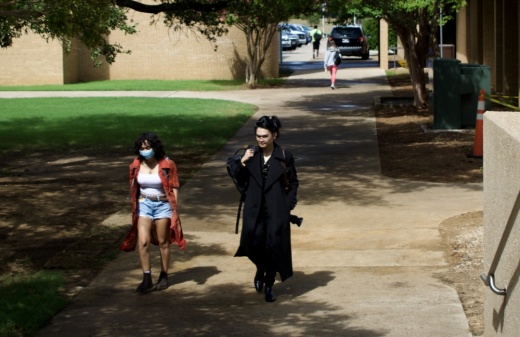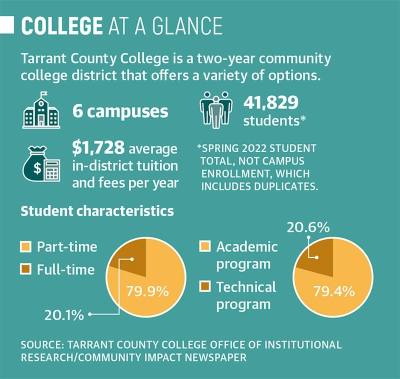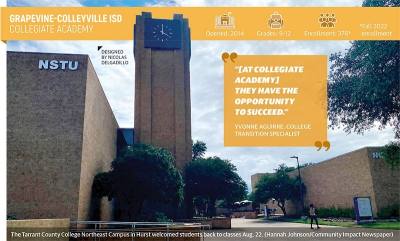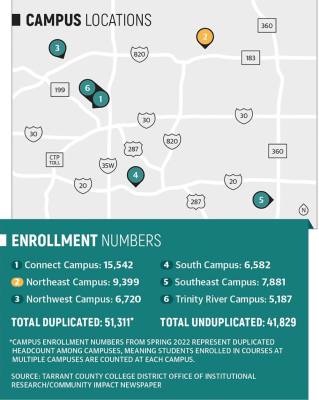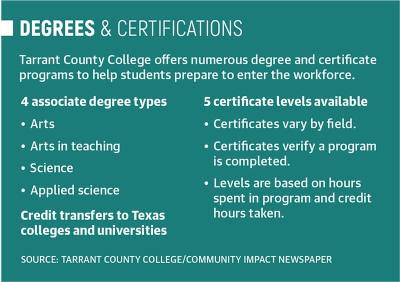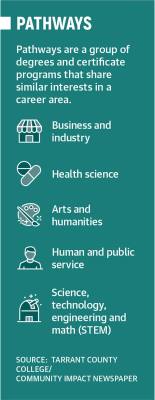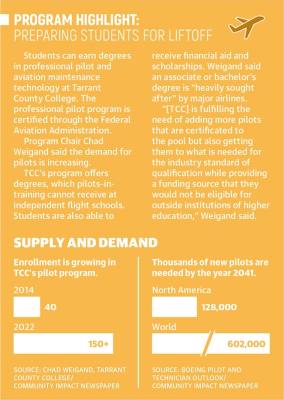Now, Sanchez is in her second year at what is known as TCC Northeast studying dental hygiene. The two-year program prepares students to take the National Board Dental Hygiene Examination after graduation.
“[TCC] is a very good option,” she said. “It’s very inexpensive, [and] you get to meet a lot of people. It’s very diverse, and there’s a lot of different programs you can explore.”
Tarrant County College, which has six campuses, had over 41,000 students in the spring 2022 semester, according to TCC’s Office of Institutional Research. Students living in Tarrant County can expect to pay $1,728 for tuition and fees for 27 credit hours, according to TCC’s business services office. For students outside the county, the average cost is $3,402.
Tuition is $64 per semester hour for a resident of Tarrant County and $126 for a resident of any other Texas county. Out-of-state tuition is $305 per credit hour.
At the University of North Texas in Denton, which is a four-year university, in-state undergraduate students will pay about $230 per credit hour. Average tuition and fees for fiscal year 2020-21 were $11,994, according to the 2021 Texas Public Higher Education Almanac.
Lower costs for higher education degrees are part of a statewide initiative. The Texas Higher Education Coordinating Board, the state’s agency for higher education, has a strategic plan called Building A Talent Strong Texas, which is focused on making it easier for students to earn college degrees.
“We want to make sure that students are better off,” said Harrison Keller, the coordinating board’s commissioner. “We want 95% of our students [to be] able to complete their degree either having no student debt at all or [having] debt that is manageable.”
Another part of the initiative is increasing employment opportunities through postsecondary credits, such as degrees, certificates or other credentials. Along with associate degrees, TCC offers a number of certifications students can earn along the way in industries ranging from heating, air conditioning and refrigeration to ophthalmic technology.
TCC’s large footprint with five campuses and the online campus offers more opportunities for student access.
Variety of programs
TCC offers over 100 programs that are broken down into pathways: arts and humanities; business and industry; health science; human and public service; and science, technology, engineering and math.
Northwest campus Student Body President Samuel Jepsen said the variety of courses offered at TCC is a big draw for students.
“We have aviation courses that you can go into [and] criminal justice. We have dance, horticulture and areas of logistics that you can major in,” Jepsen said. “It’s really neat.”
Along with courses offered, Jepsen said several financial resources are available to help students, including the Veteran Resource Center, financial aid and Prior Learning Assessments. Prior Learning Assessments, also known as PLAs, allow students to pay $25 to try and test out of required courses.
For the 2020-21 academic year, $107.9 million of financial aid was disbursed to students, according to TCC’s student financial aid services.
Jepsen also pointed out the Student Emergency Assistance Fund, which gives students up to $500 to cover unanticipated needs, such as car repairs, emergency medical care and safety-related needs, as well as the Stay the Course fund, which offers up to $1,500 to help low-income students succeed in college.
“There’s a lot of resources here on our campuses that will help students out,” Jepsen said.
Early college high schools
Collegiate high schools are another feature with Tarrant County College. The schools differ from dual-credit programs as they begin in ninth or 10th grade, rather than traditional programs that begin later in high school.
The early college high schools give students the opportunity to earn 60 college credits along with a high school diploma.
Grapevine-Colleyville ISD’s Collegiate Academy, also known as CA, is located at TCC Northeast. Students within GCISD have the opportunity to earn college credit without paying for classes or textbooks.
CA’s College Transition Specialist Yvonne Aguirre works with students as they move from the academy to a four-year university. She said she spends most of her time with first-generation students looking to attend college.
Most students may be satisfied with an associate degree, but Aguirre said she pushes them to pursue a bachelor’s degree since they already have more experience with college than a typical high school graduate.
She said students who attend CA leave with more experience in navigating a college campus, taking online classes, working with an academic advisor and communicating with professors.
“When they go to their first year of [a four-year university], they have a bump in their [academic] career,” Aguirre said.
Of the 99 students who graduated in 2022, Aguirre said 92 students were confirmed for a next step, meaning they were pursuing a bachelor’s degree or vocational training. She said 87 had received scholarships or other financial aid.
“[At CA] they have the opportunity to succeed,” Aguirre said.




